1992 Siege of the Elections Commission headquarters in Georgetown by a violent and angry crowd claiming they were not allowed to vote. (Credit: Carter Center)
Help me reach 1,000 subscribers by December 31st, 2025. Please share Emancipatory Research with anyone who enjoys reading, learning and conversing about history and geopolitics.
In the Jagan International Airport in Guyana, I was surprised to see pictures of the two former presidents who founded the two major political parties hanging above the stairway leading to the immigration area. They stared at me, as if they had called my name to attract my attention: Linden Forbes Burnham, founder of the People’s National Congress (PNC), and Cheddi Jagan, founder of the People’s Progressive Party (PPP). These two men shaped local politics for most of the 20th century and into the 21st century. Both men also left debatable legacies that molded Guyana for better or worse. However, one question lingers: Why isn’t the airport named after both Jagan and Burnham?
The E. Bank Public Road
There are two distinct versions of Guyana’s modern history. In the first version, the members of the PPP, which consisted largely of Indo-Guyanese, were cast as shepherds who, despite successful attempts by Afro-Guyanese and Portuguese politicos, two U. S. presidents, and four British prime ministers to dismantle their vision, changed Guyana into an independent nation and continue to work toward it becoming an more inclusive and prosperous country.
In the second version, the members of the PNC, which consisted largely of Afro-Guyanese, were cast as inheritors who rose from slavery to create a nation within the Caribbean diaspora. Despite the attempts by the Indo-Guyanese of the PPP to dismantle their vision, they molded Guyana into an independent and prosperous nation.
No matter which group you speak with, the answers vary. Any attempts to say otherwise, particularly with regard to the PNC, is an incendiary topic.
I quickly learned how sensitive this topic continues to be while en route from Cheddi Jagan International Airport (GEO).
Along the developing E. Bank Public Road where Chinese workers toil in the humid climate to build hotels, roads, and bridges, the Indo-Guyanese hold up traffic by guiding their cattle across the highway. This mixture of laborers highlights the future of the country and its still present agrarian past. It is a literal crossroads since the May 2015 Liza-1 oil discovery by Exxon Mobil that brought it international attention.
Yet my focus was more on how this new wealth would be managed, especially given Guyana’s volatile and racially charged politics.
Thibert: “A lot of people believe that (Forbes) Burnham (PNC) actually stole the elections.”
My Afro-Guyanese taxi driver makes the sound that all children of the Caribbean and African diaspora are familiar with: a frustrated sound specifically directed at my questions and comments.
Taxi Driver: “That was the whole art of the day. Let me help you by telling you a story. Let me break it down into small parts. Let me start back from the British when there was one political party in this country—the People’s Progressive Party.”
I interrupted and redirect our conversation to the period prior to formation of this party.
1. United States Presidents John F. Kennedy (1961–1963), Lyndon B. Johnson (1963–1969), United Kingdom Prime Ministers Winston Churchill (1940–1945, 1951–1955), Clement Atlee (1945–1951), Harold MacMillan (1957–1963), and Harold Wilson (1964–1970, 1974–1976).
Forbes Burnham & Cheddi Jagan on their way to London and India – 1953
Land of Three to Six Peoples
Early in 2020, the National Security Archive released a number of documents that had recently been declassified. One document piqued my interest because its contents referred to an American CIA operation in 1964 pertaining to Guyanese politics. This document specifically mentions the recently elected prime minister of British Guiana (its name from 1831 to 1966), Cheddi Jagan.
“U.S. intelligence concluded that Prime Minister Cheddi Jagan, one of the main presidential candidates in the upcoming 1964 elections, is a communist, although not necessarily under the sway of Moscow.”
What prompted this classification? The Cold War and the decolonization of former colonies into new nations. British Guinea (modern-day Guyana) is the only English-speaking country in South America. A British possession since 1796 (previously Dutch and temporarily French), its history and colonization put it more in line with the Caribbean countries, especially Trinidad and Tobago and Grenada.
Guyana is currently referred to as the “Land of Six Peoples,” although you might only encounter three at most:
(1) The indigenous Amerindians are composed of 12 groups spread throughout the coast and interior of the country.
(2) The formerly enslaved Africans arrived via the slave trade (1580–1834) and you’ll primarily see them in and around the capital of Georgetown (named after King George III).
(3) and (4) The Indians and Chinese were brought in as indentured servants (1838–1917) and are now found spread throughout the country.
(5) The Portuguese (1834–1882) came mainly from Madeira with some from the Azores, Cape Verde, and Brazil.
(6) and lastly the British.
Like other colonial powers, England was unable to hold onto all of her possessions after World War II. The only real option was decolonization, but as the Cold War continued and U.S. interference intensified, the process became more contemptuous for England in Guyana than in other regions.
Mural of AmerIndians, Guyana National Museum in Georgetown, 2024
Politics and Pigments
While conducting field interviews throughout Guyana, I always started with the same question: “Is race an issue when it comes to national politics?” The answer was always a resounding, “yes.” No one ever provided a solid answer to the issue’s origin but everyone knew how it intensified. The only plausible clue to its origin was from an interview that resulted in the mention of the Local Content Act of 2021. This law was created to benefit Guyanese nationals in terms of employment opportunities related to the developing oil and gas industry.
The response was that, for the Afro-Guyanese, the Act still did not benefit them because the Indo-Guyanese owned most of the land, businesses, and generational wealth. To me, the answer provided a starting point.
Cheddi Jagan said, “To those pessimists who say that the Indian and Negro workers cannot be united, I say look back to the situation before the 1950s. Then, too, it appeared that the two ethnic groups could not be united.”
Jagan believed that the problems between these two groups were from an imperialistic divide-and-conquer technique. Thus - his perspective, decision making, and policies were centered on breaking down classes through communism. His ideas never addressed the problem and, in fact, deepened them. Although “divide and conquer” played a part, the real divide came from differentiating the cultures and being suspicious of each other that led to conflicts. Indians were brought in to replace the African slave trade instead of offering Africans’ fair wage work. When their “contracts” were up, they were given land and wages as compensation. This arrangement was better than anything available to them in Northern India. Africans were also given some land as reparation and most of them sold their land to Indians.
Today you see this in the geography. Afro-Guyanese can mostly be found in Georgetown and surrounding areas holding positions in the police department, military, and services. Indo-Guyanese are mainly cultivating farms and pursuing politics. Thus, a stereotype developed of the big burly African beating on the weaker Indian. This divide can best be summarized by a quote from Eusi Kwayana (formerly Sydney King) in 1992. He is Afro-Guyanese and held the position of cabinet minister for the PPP.
“There are these racial insecurities. The two major groups have certain conceptions of each other. Africans tended to see Indians not only as clannish but of having more money and having an interest in land. A lot of them were selling their own land (to Indians) when they went broke, and although they were doing it voluntarily, it also alarmed them. Then there was this rumor that someone from India had come and said that those who owned the land, owned the country. You hear this a lot with older people…a lot of Africans were unable to go beyond that.”
Through the early half of the 19th century, two different racial spheres developed as British Guinea moved slowly toward decolonization. Indians grew closer to India, especially after the Partition (1947) and became encouraged to move toward an East India colonization scheme, “an idea that some Africans appeared to also entertain .” according to Eusi Kwayana. This direction involved the mass migration of Indians to British Guinea and created a larger majority. Talks of partitioning the land mass along racial lines were also discussed to make this a reality.
Africans were experiencing Pan Africanism (1920s–1930s) through (Marcus) Garveyism and the United Negro Improvement Association (UNIA), and a sense of self that was previously not found within the country began to develop. This brought cohesion within the African population.
Both groups faced bans by the British during this time. Then in the 1950s, the PPP political party was created that represented the majority ethnic groups. Its founders were Cheddi Jagan, Forbes Burnham, and Janet Jagan. Dr. Cheddi Jagan became British Guinea’s chief minister in 1953 and then prime minister (1961–1964).
Indo-Guyanese workers, 2024
No Second Cuba and the CIA
Eusi Kwayana (formerly Sydney King) once commented, “Marxism was a façade to deflect scrutiny of (Cheddi Jagan’s) principal goal of Indian supremacy.” As the country moved closer to independence, the prevailing thought became, Independence for whom? The African or Indian?
Kwayana continued by saying, “We have known all along that the Indians would not trust a black leader, and that the Africans would not trust an Indian leader. We could see then that any attempt of the one to rule the other will lead to blood baths…. Your people, Jagan, do not trust a black leader; and my people do not trust an Indian leader. Therefore, we must find a special solution and not pretend. Our problem is similar to that of India in 1947”
Wins for Indians became defeats for Africans and vice versa. By 1957, this led to the formation of the People’s National Congress by Forbes Burnham and other former members of the PPP who focused on Africans. Sometimes, they worked with the Portuguese party, the United Force (UF), led by Peter D’Aguilar. This relationship was detested by both himself and his wife due to the insinuation that they were acquiescing to Africans, especially Burnham.
As colonial secretary for the British, Iain Macleod (1959– 1961) gave Prime Minister Cheddi Jagan latitude during the start of his term. Macleod was concerned with Jagan’s unflinching relationship with Fidel Castro and his already strong conviction toward Communism. This led to Jagan’s political downfall. By 1962, it had been decided by the United States under President John F. Kennedy that Jagan’s political career had to come to an end.
This decision stemmed from two separate events. The first was the October 25, 1961 meeting between President Kennedy and Prime Minister Jagan at the White House. Despite not knowing the details of the private meeting, it has been determined by later actions that by their conversation’s end, Kennedy saw Jagan as a threat. The second was the Cold War and sphere of influence of the Soviet Union that included the Castro regime of Cuba. Kennedy was determined not to have another Cuba within the Americas. This meant stalling the decolonization process.
Macleod went on to comment to Professor Arthur Schlesinger, who was an advisor to President Kennedy, “He is a naïve, London School of Economics Marxist filled with charm, personal honesty and juvenile nationalism.”
Regardless, now within the sights of the U.S. CIA, the country experienced a number of riots and setbacks seemingly set off by statements made by Jagan and which intensified race relationships.
The head of the U.S. Agency of International Development, Fowler Hamilton (1961–1962) went on to later admit that CIA personnel entered the country on January 18, 1962 under the pretext of possibly giving a $5 million loan to the government of British Guiana. Only a month later, one of many setbacks to Jagan’s term due to CIA intervention commenced.
The Black Friday riots occurred on February 16, 1962, seemingly set off by the announcement of Jagan’s budgetary reforms named the “Kaldor Budget.” The Trade Union Council (TUC) initiated a protest that was spurred on by a speech by Burnham. The event led to the destruction of 56 businesses. Other race riots, strikes, and attacks happened throughout the 1960s. One of the most prominent was the Wismar Massacre (1964) when Africans attacked, murdered, raped, and maimed Indians over a 38-hour period.
Throughout these events, the promise that the British government made to British Guineas—independence—stayed on course. Despite this promise, state hood could not be granted while Jagan was the leader. Forbes Burnham was a safe alternative pick, although not a favored one within both the British and American governments. Regardless, he showed communist leanings but not as serious or inflexible as Jagan. He was a morally flexible choice.
This still left the country with Jagan who was now in the crosshairs of Duncan Sandy.
Sandy’s Plan
At what is referred to as the Birch Grove Summit (June 30, 1963), the site of Prime Minister Harold Macmillan’s county house in Sussex, the prime minister acquiesced to American interests to keep British Guinea away from Russian influence, which was nicknamed “Castroism.”
What came out of the summit became a focused plan on how to hold a referendum on deciding a new electoral system (Proportional Representation) in a tactical move touted by Forbes Burnham before elections that were now backed by the U.S. and U.K. governments.
Desmond Thomas, author of Electoral System Reform for a Diverse Nation: The Case of Guyana, provides more context to the exact climate and result of the change in voting system:
“The basic elements of the current electoral system were composed and enacted during the late 1950s into the early 1960s. The significance of this is that it was one of the most turbulent periods of the country’s political history. In particular, the period from 1961 to 1964 was characterized by political and racial violence resulting in hundreds of dead, injured, and displaced, major industrial interruptions that left much of the commercial center in Georgetown in cinders, and legislative protests that crippled Parliament” (p. 103).
Under this environment, the change in electoral system benefited the minority PNC/UF coalition party. “The PPP clamored for the British to grant independence but under pressure from the U.S. government, there was a determination the colony would not be granted independence under a PPP government. With hostilities in the colony escalating, the term of government was shortened. The parties reached an agreement in talks with the British government for the electoral system to be changed from First Past the Post Voting (FPTP) (which is used by the British government) to Proportional Representation. The conversion to the PR system effectively eliminated the possibility of a party benefiting from a seat bonus. With seats gained in proportion to votes, the PPP did not achieve a majority of seats (in the 1964 election), although it remained the largest party in terms votes” (p. 107).
The architect of these ideas was Colonial Secretary Duncan Sandys, who was an invitee to Birch Grove due to his significance to Her Majesty’s Government.
As Colonial Secretary, Sandy’s role was to oversee the dismantling of overseas colonies under the “Winds of Change” speech (1960) in which PM Macmillan suggested that “it was a responsibility of the British government to promote the creation of societies in which the rights of all individuals were upheld.”
A part of his inclusion became his ideas to combine the PNC/UF, the backing of Burnham as a future president, and the suspension of the Constitution (1964) to reinstate direct British rule until a proper transition can take place. Just as determined to remove Jagan from political power but weary of international outlash, Sandy’s coup de grace was a scheme to successfully trick Cheddi Jagan into transferring authority to change the electoral system and end his political career as prime minister.
By the time the PPP realized what had transpired, it was too late. For the next 28 years (19641–1992), the PPP were sidelined in politics, resulting in jail time and a lack of a political voice.
On December 7, 1964, Forbes Burnham became the new prime minister of British Guinea (1964–1966) and future president (1964–1985) of an “Independent” Guyana. Cheddi Jagan refused to resign and was removed forcefully from his position.
Duncan Sandy talking about De Gaulle blocking Britain's entry into the Common Market
The Dictatorship That Never Was
Despite numerous Guyanese stating during interviews that Burnham was never the head of a dictatorship, I constantly received a sense that it is best for their own wellbeing to keep their opinions to themselves. It was only under assurances that I would not reveal their identities that various interviewees admitted, with some hesitation, that he used illegal means to stay in power.
The one clear message that I received from each interviewee is that, during his consecutive terms, there was a noticeable increase in Afro-Guyanese voices and identity.
Why Linden Forbes Burnham? We’ve already established that, unlike Jagan, he was not considered a serious Marxist. Instead, Burnham presented a counterbalance to the more intellectual and pensive Jagan. He was fiery and passionate. Traits undoubtedly learned from his background as a lawyer and orator. Regardless, without wanting to risk any issue with his former rival, Burnham effectively placed Jagan in political limbo.
As long as he kept away from both the Soviet Union and Cuban influences and remained under the direction of both the U.S. and U.K. governments, he could run the government. This latitude is exemplified by a visit to the White House to meet U.S. President Lyndon B. Johnson (1966) and assurances given to consul general of British Guiana, Delmar Carlson, that he would:
• Not recognize the USSR.
• Not recognize or associate in any way with the Castro regime.
• Cut off trade with Cuba if asked to do so, provided that the U.S. arranged an equally good market for British Guiana’s rice.
• Join the Organization of American States (OAS) that was created (1948) to strengthen peace and security in Americas. Promote representative democracy, and ensure the peaceful settlement of disputes among members.
• Not use racial considerations to determine government policy.
• Not plan to take over the trade union movement.
• Not be interested in establishing a dictatorial regime.
Despite these promises, he later went on to disregard their agreement throughout his 28-year reign. He did this while also attempting to court the Indo-Guyanese and AmerIndian population that was largely PPP. This is conveyed in a speech that he delivered in 1965 to the Press Club of America:
“The strife which we have witnessed in our country, over the past three years; this strife has now come to an end, was primarily between the Indians and the Africans. The political orientation of the electorate was in 1961 and 1964, under voting returns, largely racial. The bulk of the Indian population, supported the PPP, led by Dr. Jagan and the bulk of the African population supported the PNC, led by myself.
“It seems to me, and it should seem to anyone looking at the matter objectively, that the PNC never had a vested interest in racism, because of the bulk of its voting strength is from the Indian, and the Indians have been increasing and are continuing to increase more rapidly than the Africans a leader of a party which gets a lot of African support, must be dooming himself to a political wilderness if he is going to play race.”
On May 26, 1966, Guyana became independent (it later became a Commonwealth member on February 23, 1970), on the anniversary of the Wismar Massacre. Shortly thereafter, the National Security Act (removed 1981) was passed allowing for the removal of habeas corpus and the detainment of any Guyanese dissidents without formal charges. Its creation allowed for heavy fines and/or extended jail time for any current or future political threats. This includes written works, maps, and comments that became causes for punishment by the law. The press was similarly under threat due to the law. As a further deterrent, the police and army (which were largely Afro-Guyanese) were also used to harass, punish, and seek out any threats to the Burnham dictatorship.
Rice farmers were mostly Indo-Guyanese and sugar workers experienced losses during this period due to the lack of fair rates, wages, and modernization projects that were replaced with harassment and losses of opportunities.
President Linden Forbes Burnham
Cult of Personality
By the early 1970s, Burnham nationalized the rice industry and placed Afro-Guyanese with little experience in positions of importance. The railway system was systematically scrapped (1972–1974), a loss that many Guyanese, even today, say was a mistake. The sugar and bauxite industries where also nationalized, and by the end of the decade, anti-labor laws became strict and hurt both Afro- and Indo-Guyanese. Due to these factors, Guyana experienced mass migration to destinations in Canada and the United States, creating huge diasporas within those countries.
It was also during this decade that all assurances given to the U.S. and U.K. governments were disregarded, leading to both groups deciding to cut him off from any future assistance. By this point, Burnham was considered mostly harmless but annoying. This break in their relationships lead to the most egregious election fraud of Burnham’s consecutive terms taking place in 1973.
Previous elections had used the CIA for a smoother hold on power. This election was now managed internally by mail in votes of Guyanese in the diaspora who were still allowed to cast a vote. What was uncovered is that many of the Guyanese who were listed at various addressed either did not live there, had never left the country, or had passed away. In country votes were also collected, reviewed, and counted in private before the tally was revealed by election officials.
“Under the Burnham administration, the PNC repressive apparatus also included the House of Israel, a so-called religious cult of Afro-Guyanese, founded by an Afro-American fugitive from U.S. justice, David Hill, who called himself Rabbi Washington. This group openly supported the PNC and was used regularly by that party to break strikes and also, even in the presence of the police, to violently break up public meetings organized by opposition political groups. On 14 July 1979 its members in broad daylight brutally attacked a WPA political demonstration and murdered a Jesuit priest, Father Bernard Darke” (See guyananews.org).
The details provide a frame of what life and the environment of Guyanese nationals were like and how further loss of liberties increases during Burnham’s presidency. What has not been detailed is the effect all of this did to the economy, which by the 1980s needed outside consultation by the International Monetary Fund (IMF).
There were attempts to improve the well-being of Guyanese through the Feeding, Clothing, and Housing Guyana (1972), which was deemed Burnham’s flirtation with cooperative socialism. Ultimately, it failed due to the need of Indo-Guyanese to grow, develop, and assist with large parts of the project. Many of the Guyanese needed were in favor of the PPP and experienced hardships under the PNC Burnham government. In the end, it was Burnham’s earlier decisions that resulted in the end of any and all programs to improve the lives of Guyanese.
As for the black nationalism that led to Black Guyanese standing behind Burnham, a younger more militant generation of black thought took root in the late 1970s. Walter Rodney’s Working People’s Alliance (WPA) stood to compete with the PNC, but by June 13, 1980, Rodney was dead. He was assassinated at age 38 by an explosive device planted in his walkie talkie, which was considered an illegal device at the time.
What ended the Burnham dictatorship was his death on August 6, 1985 due to heart failure. Democracy slowly came under increased pressure to hold fair and honest elections under successor Desmond Hoyte who could not hold on to power due to monetary needs, a struggling economy, and the oversight of the Jimmy Carter Center, which took a direct hand (and continued until 2020) in the voting apparatus. In 1992, Cheddi Jagan became the newly elected president, and he was followed by the election of his wife Janet Jagan after his death in 1997.
Guyanese National relaxing on Burnham’s Mausoleum, Botanical Gardens, Georgetown 2024
Before the Oil
On December 19, 1997, Prime Minister Janet Jagan arrived at the Georgetown State House to be sworn in as Guyana’s first female president. Building upon both her previous projects and the work of her husband, Cheddi Jagan focused her campaign on infrastructure, housing, women’s rights, healthcare, education, national debt, foreign investment, and improving relations with AmerIndians.
The issues instead focused on her whiteness.
Janet Jagan nee Rosenberg was born in Chicago in 1920. Raised in a Jewish family, she had been living in Guyana since 1943, after a brief whirlwind romance and marriage to Dr. Cheddi Jagan. By 1966, she became a Guyanaese citizen and did not look back or seek dual citizenship once the option became available.
Regardless of her national service and decades of residency, race once again entered the political debate. Political commenter Dr. David Hinds (in 2011) provides his view of the race baiting used during her campaign. “If her candidacy united the PPP, it widened the ethnic gulf in the country. The PNC (under political opponent Desmond Hoyte) The PNC and the African Guyanese in general reacted negatively to the possibility of her presidency.” Regardless of her winning the election on the day of her swearing in she was met by two marshals serving a court order preventing ascendancy to the presidency. She immediately balled it up and threw it over her shoulder before being sworn in.
President Jagan’s political problems were only beginning. Dogged by the PNC and facing an increase in racial violence, in an effort to deescalate the violence, she relented to what is referred to as the Herdmanston Accord. One of the stipulations was ending her political term early.
“Chosen by former President Janet Jagen to succeed her in office, and supposedly held in high esteem by Guyana’s founding father, the illustrious Cheddi Jagan, Jagdeo could only receive the lowest of marks from any independent evaluation. Through his tolerance of crime, racism, and dismal social progress, President Jagdeo has turned in a fifth-rate performance as president of one of the poorest countries in the hemisphere. As the Guyanese use every strategy, legal and illegal, to flee the dysfunctional country, Jagdeo will go down in history as a man who did almost nothing for his nation while in office,” according to Elcin Change and Robert Cavooris in “Guyanese President Leaves a Tattered Legacy,” Truthout, January 29, 2011.
Race never ceased being an issue, in particular when it comes to the election season. Throughout the first quarter of the 21st century, the continued use of race-baiting thrived as the election itself became overseen by international media and assisted by the Carter Center. Regardless of the measures used to create a democratic election process, accusations abound of political trickery that ultimately led to mass protests. These events caused former President Jimmy Carter to attest in 2004 that, “The Guyanese government remains divided with a winner-takes-all concept that continues to polarize many aspects of the nation’s life.”
Allegations of Afro-Guyanese raping Indo-Guyanese girls/women became a go-to tactic as presidential candidates insist they will improve race relations. A fear that was ramped up by the use of death squads, formed from the Guyana Police Force, to exercise extrajudicial murders and intimidation.
The current apathy and frustration that I encountered toward the election process has thrived thus leading to my interview questions regarding political affiliation returning with the constant response of no affiliation.
Janet Jagan proposing a boycott of the Queen to protest against UK oppression of British Guinea, 1966 (credit Getty)
The Social Contract
The two names that summarize the political landscape of the 2010s are former President Donald Ramotar (2011–2015), a long-time steward of the PPP party and former Brigadier, President David A. Granger (2015–2020) of the coalition People’s National Congress Reform (PNCR).
I was lucky to have the opportunity to speak with former President Ramotar who summarized his term as strong, especially in terms of the economy and comparatively to the rest of the CARICOM (Caribbean Community) but dwarfed by the 2015 Liza discovery. This is despite a 2014 Kaiteur News article that summarized his presidency as a “disgrace and continued corruption” and that the general opinion is that nothing changed during his single term. An opinion highlighted by the lack of development in rural areas.
Former President Granger’s 2012 self-published book, Public Policy: The Crisis of Governance in Guyana gives a snapshot of the various issues that later formed Granger’s political platform: human trafficking, loss of opportunities for Afro-Guyanese, political corruption from within the PPP, and national security. The book highlights what Granger states is a breach of a “social contract between the citizen and the government” that all Guyanese are entitled to. His later actions betray these sensibilities.
“In an attempt to remove the possibility of a no-confidence motion shortening the lifespan of a government, President Granger proposed that upon his re-election, constitutional changes be made to remove the possibility” according to Stephen Kission in Democracy in Distress,2020 (p. 85).
As Ramotar is seen as a kindly old man dwarfed by his cabinet and decisions that included adding former President Jagdeo to his inner circle, he was ultimately viewed as a dictator during his final days in office. Granger is also seen as a dictator in the making because he used the same tactics as Forbes Burnham to attempt to hold on to the residency.
“Guyana and the watching world looked on transfixed as the tactics and strategy of a campaign during elections 2015 skirmished with, if not outright immersed itself in, the self destructive. It started slowly and cleverly enough, but rapidly deteriorated into deliberate, uncaring, and uncontrolled momentum toward preconceived objectives that were intentionally divisive and inherently dangerous” according to GHK Lall in Guyana Elections 2015: Harder Truths, Harder Challenges.
The 2015 election between Ramotar and Granger is one of many enduring examples of race politics and concluded with Ramotar suspending parliament to avoid a no-confidence motion. Ultimately, Ramotar accepted his loss, allowing Granger to become president. The 2020 election between Granger and Mohamed Irfaan Ali (2020–20XX) was not as smooth a transition. Not only did it ring familiar to events during the previous election but due to a five-month standoff during which Granger did not concede and the Carter Center was not allowed to assist by citing the then current COVID crisis as the reason why. The 2020 election came close to becoming an international incident with sanctions being used as a tool to force Granger to accept the results.
GRANGER DANGER...Lies & Lies now SANCTIONS, 2020
Congratulations on Your £370 and Conclusion
Preceding each of my street interviews, I made the remark, “Congratulations on your £370.” The response regardless of ethnic group always received a laugh, allowing me to set an easier mood and hopefully gain an interview. The comment itself is in reference to the November 6, 2024, announcement of the Ali government (PPP) that each Guyanese National will receive 100,000 Guyanese dollars per person from the oil wealth (equal to £370). This decision annoyed each person that I spoke with due to the sheer wealth of the oil deposit. Regardless, by the end of a few conversations, I was left with the impression that each ethnic group viewed the oil and current politics on different terms.
The AmerIndians, who are now in a coalition with the PPP/C (People’s Progressive Party/Civic), are pleased to receive new hospitals, improved schools, and other improvements to their communities. A relationship built upon the earlier work of former President Janet Jagan
A number of Indo-Guyanese made comments in regards to being pleased with President Ali, especially due to his long commitments in politics, having a consistent plan, and that the race-baiting of the political cycle is in the past as younger Guyanese are not so easily swayed by race but by the issues.
The comment reminded me of President Ali’s 2023 promise to Guyanese Nationals: “I assure you today that my commitment and my desire to destroy racism, to destroy disunity, to remove it from the psyche of our people, to disallow the intellectual authors [from using] it will succeed,” President Ali, Social Media post, 2023
It was among the Afro-Guyanese that I received mixed opinions centered on opinions that a high number of Indo-Guyanese were put in prominent positions in government and fraud charges from 2011–2015 relating to plots of land that were undervalued and sold to government officials. Charges that were later withdrawn upon Ali becoming president.
Yet despite the former charges and accusations, it is hard to ignore the current development stemming from the ExxonMobil oil deal. It leaves me to believe that author Desmond Thomas’ observation for Guyana is accurate, “overcoming the trauma of doubt, suspicion, cynicism, resignation about the possibility of positive change can only begin when the electoral system is changed and the past is left behind.”
Interested in learning about the economic history of Guyana? Click below.





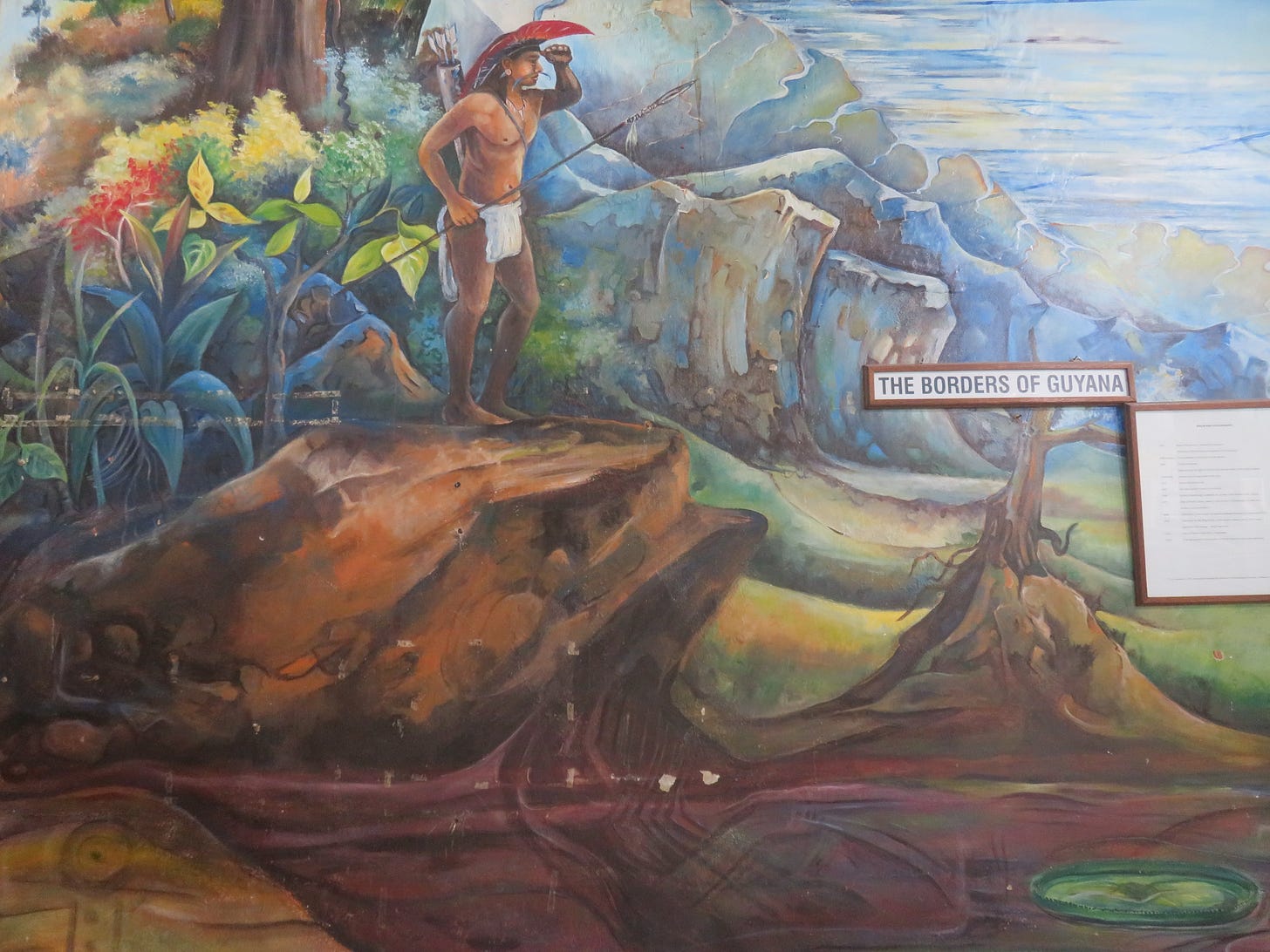
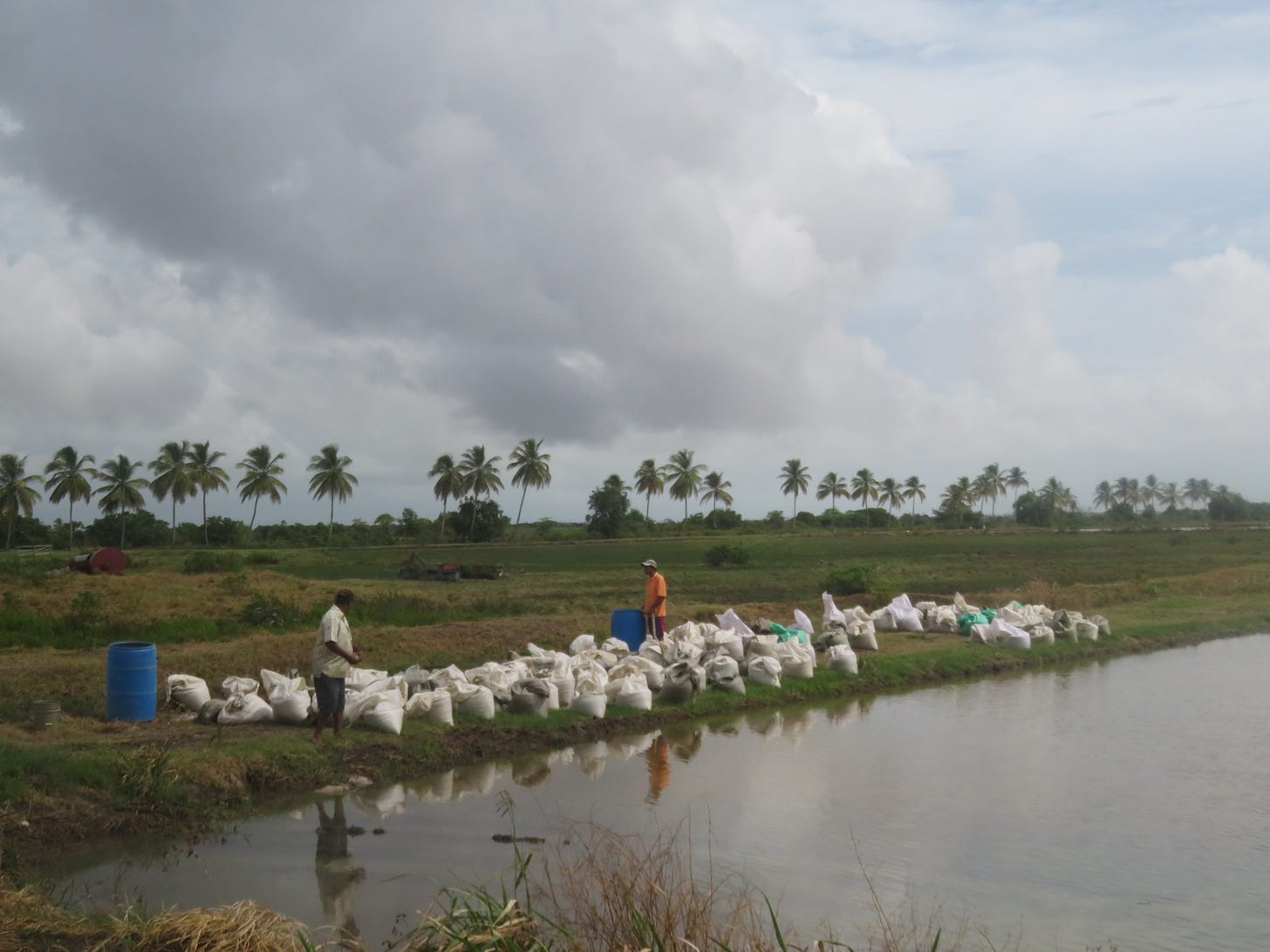

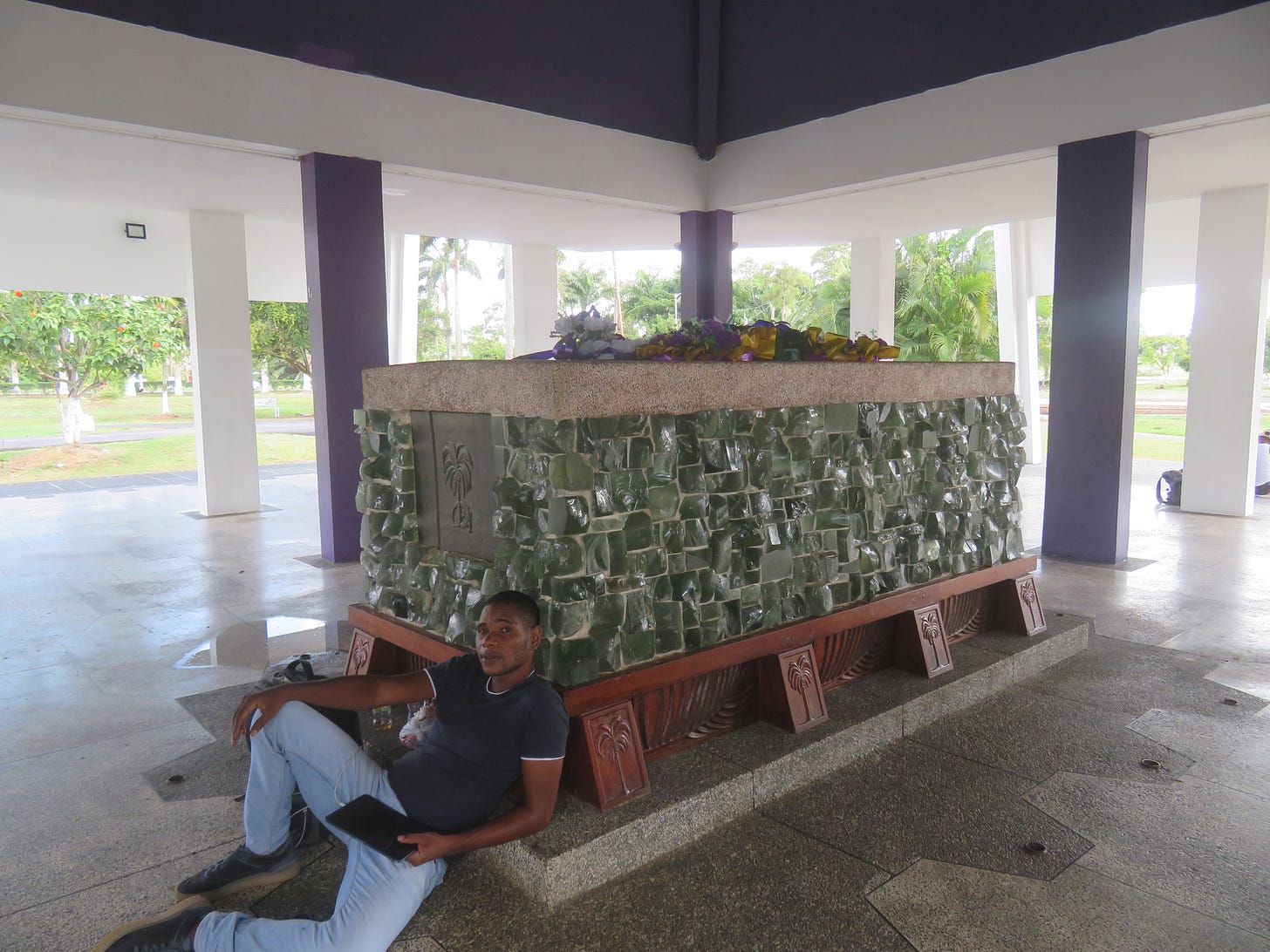


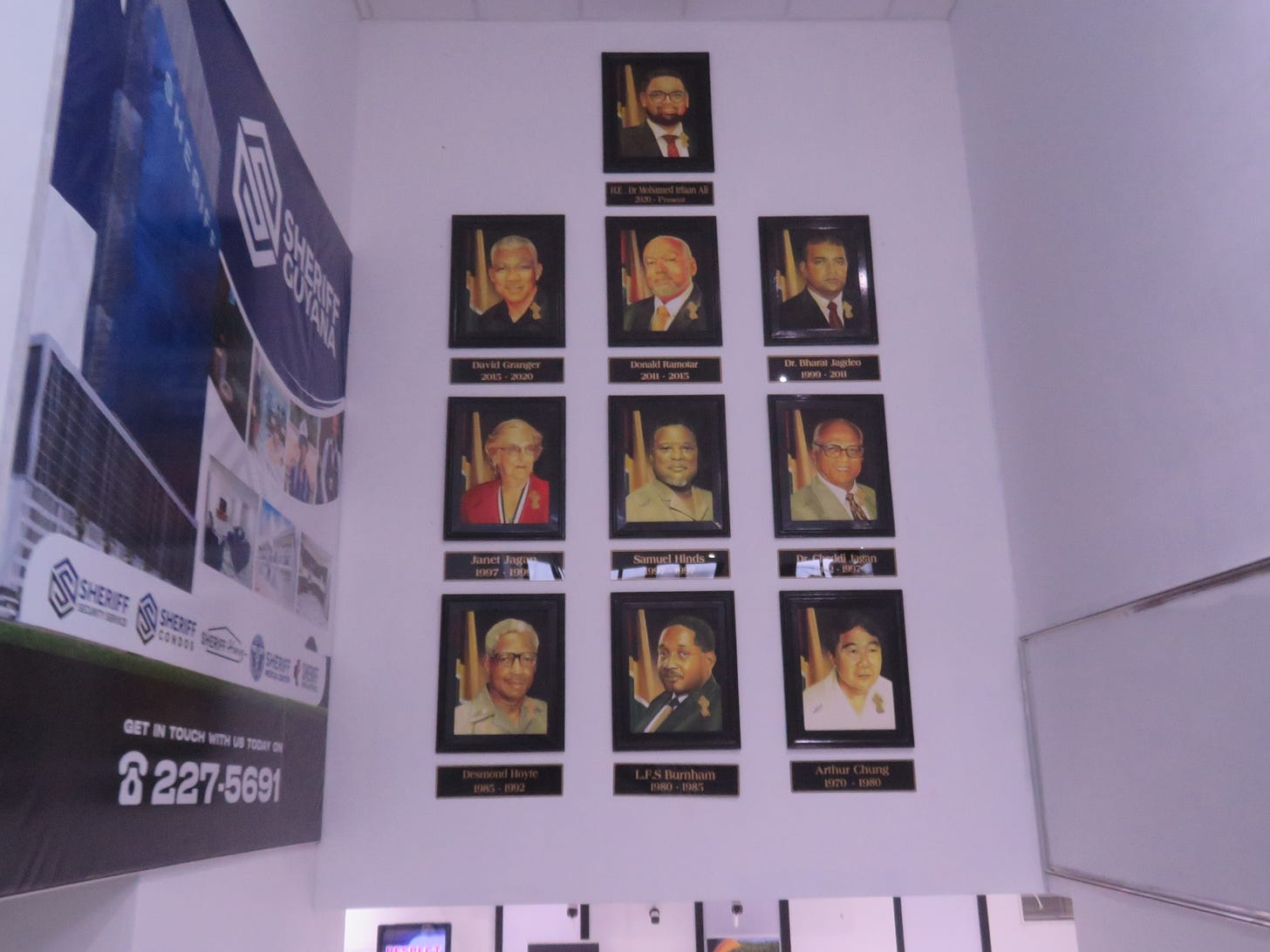
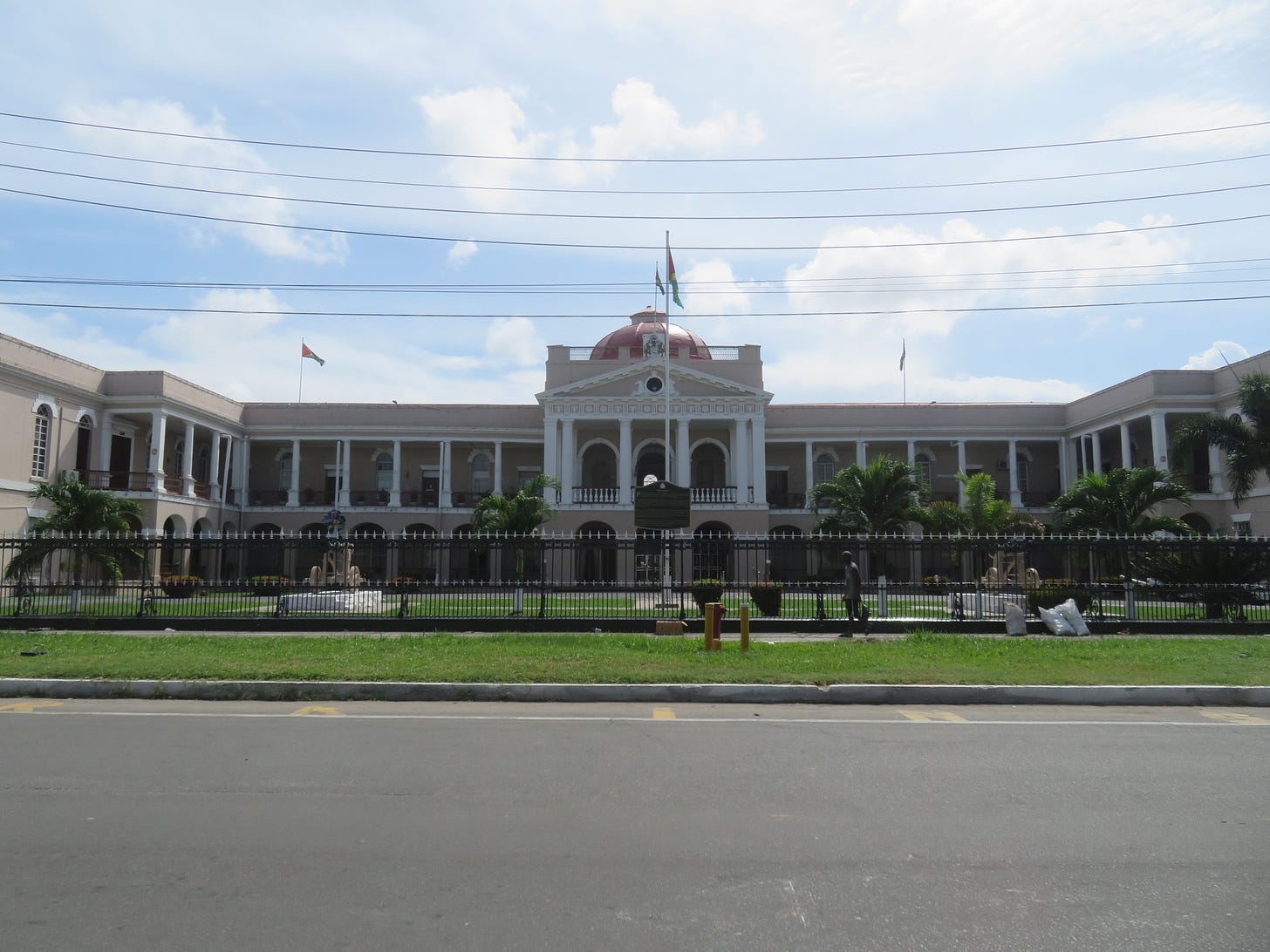
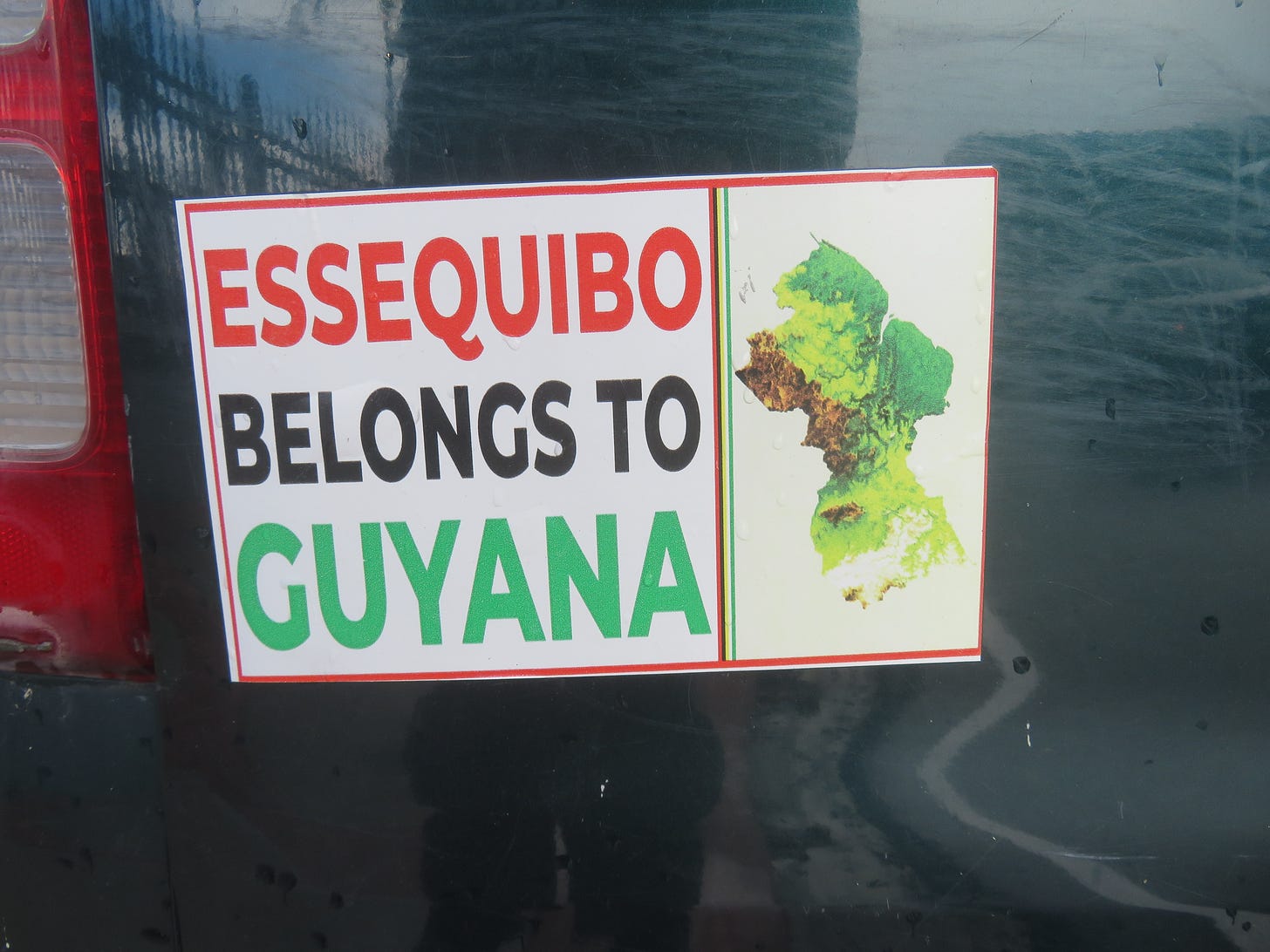
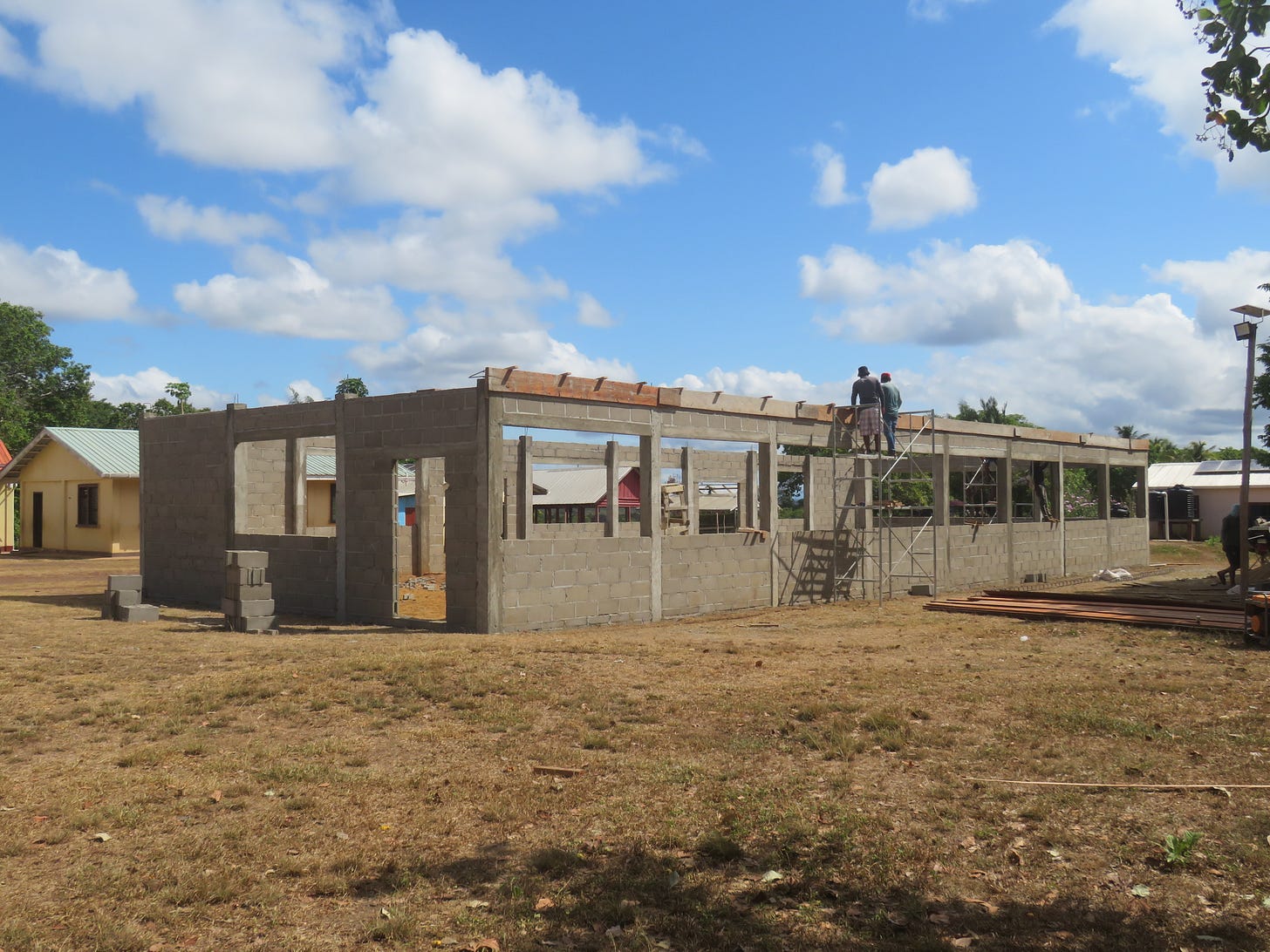
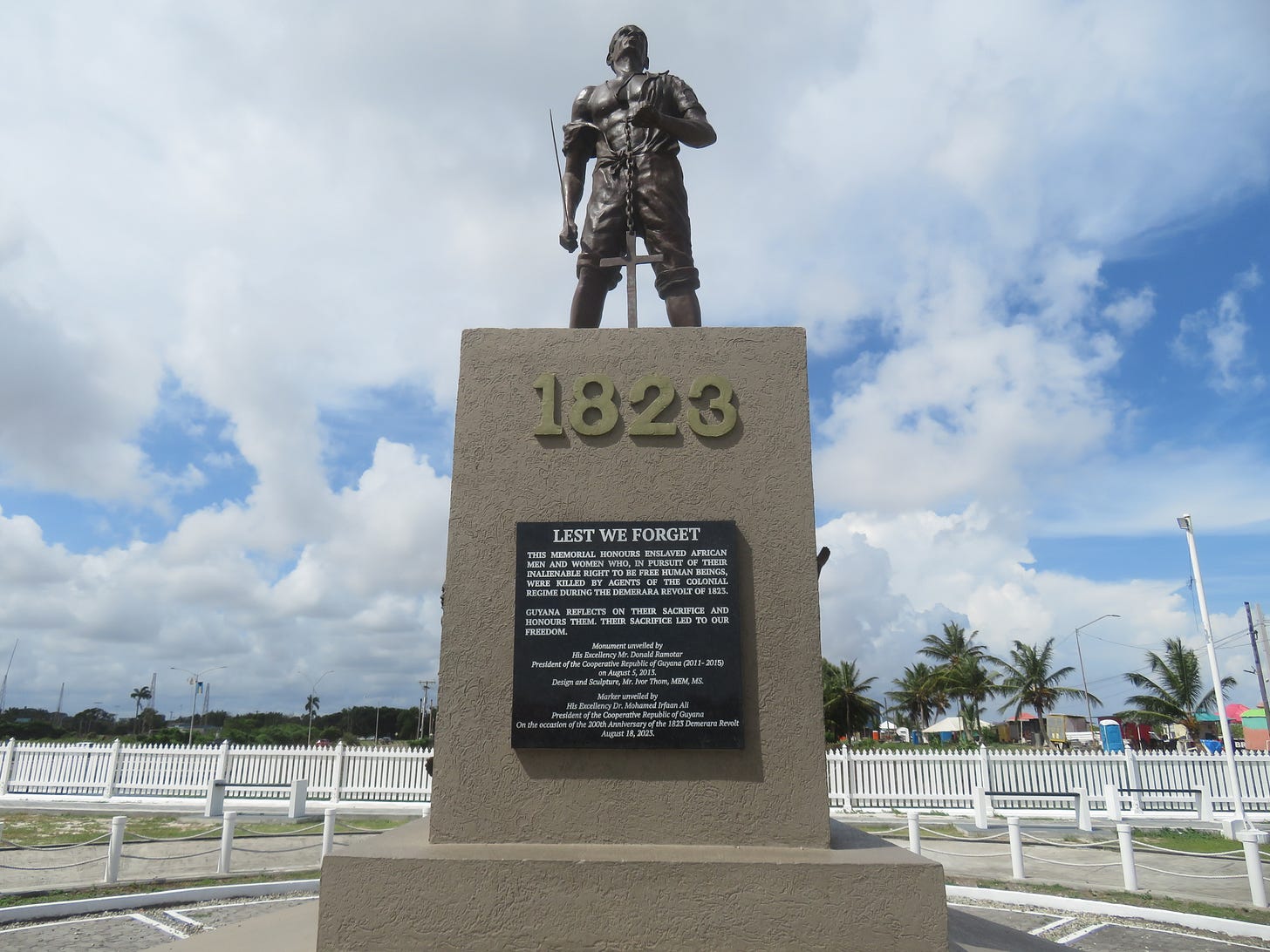
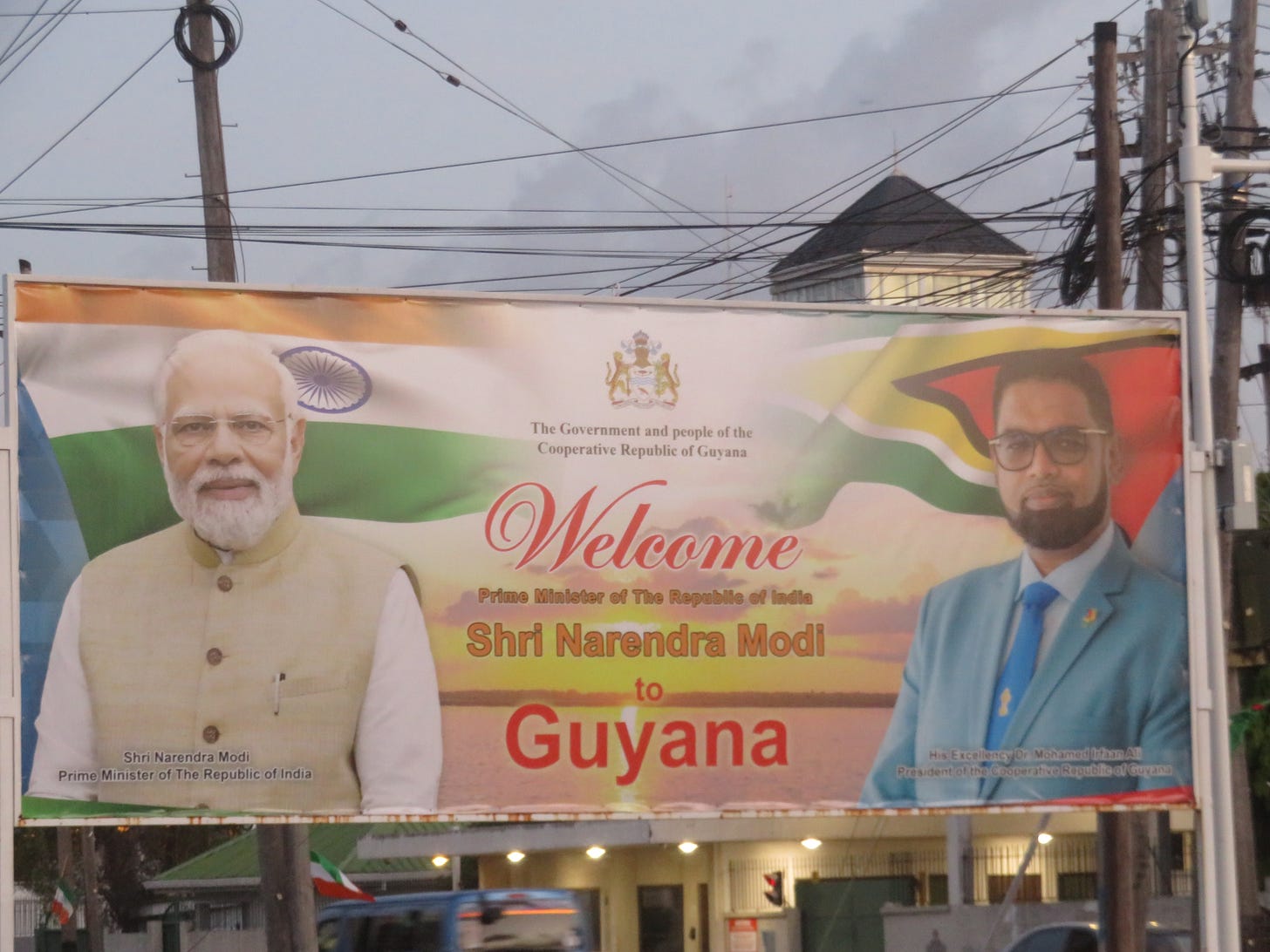
"U.S. intelligence concluded that Prime Minister Cheddi Jagan... is a communist, although not necessarily under the sway of Moscow. What prompted this classification? The Cold War and the decolonization of former colonies into new nations."
Are these a misquotes from Jagan?
"Karl Marx made me understand what makes the world go around. Our own heroes and Lenin, Gandhi and King taught me how to change Guyana and inspired me to struggle: Gandhi for independence, King for equality and against racism, Lenin for socialism."
"for the Presidency is only a means to an end, to attain the end is to attain a sane and safe world, to bring an end to exploitation, suffering and misery, to construct a New Global Human Order. The struggle will continue.", 1995"
"Every means must be good in itself no matter in what stage of struggle. Freedom is inseparable from struggle"
"I have always associated myself with the ideology of the working class, and I have led a very strong working-class party for the past 47 years...For me, Marxism neither was nor is dogma, but a scientific guide to action. It gave me strong ethical beliefs in social justice, particularly in helping the poor, the underprivileged and the exploited"
"It was a major tragedy for Guyana that a section of the working class was deluded into forging its own chains by directing its attack not, as previously, against the capitalists and landlords but against a national, pro-working class, socialist-oriented government"
He kind of sounds like...
Source for the quotes: https://jagan.org/Quotations/cj_quotations.html